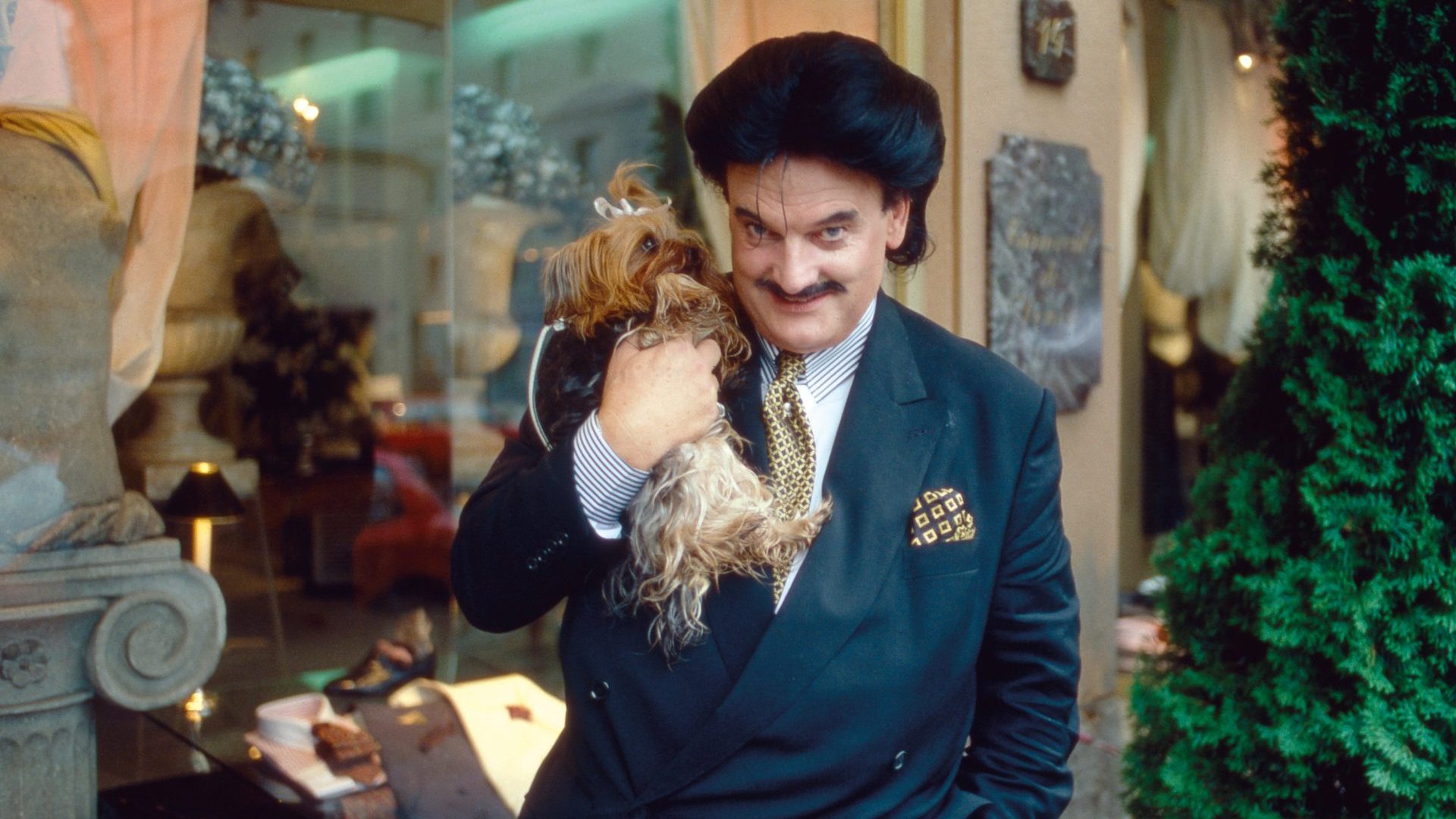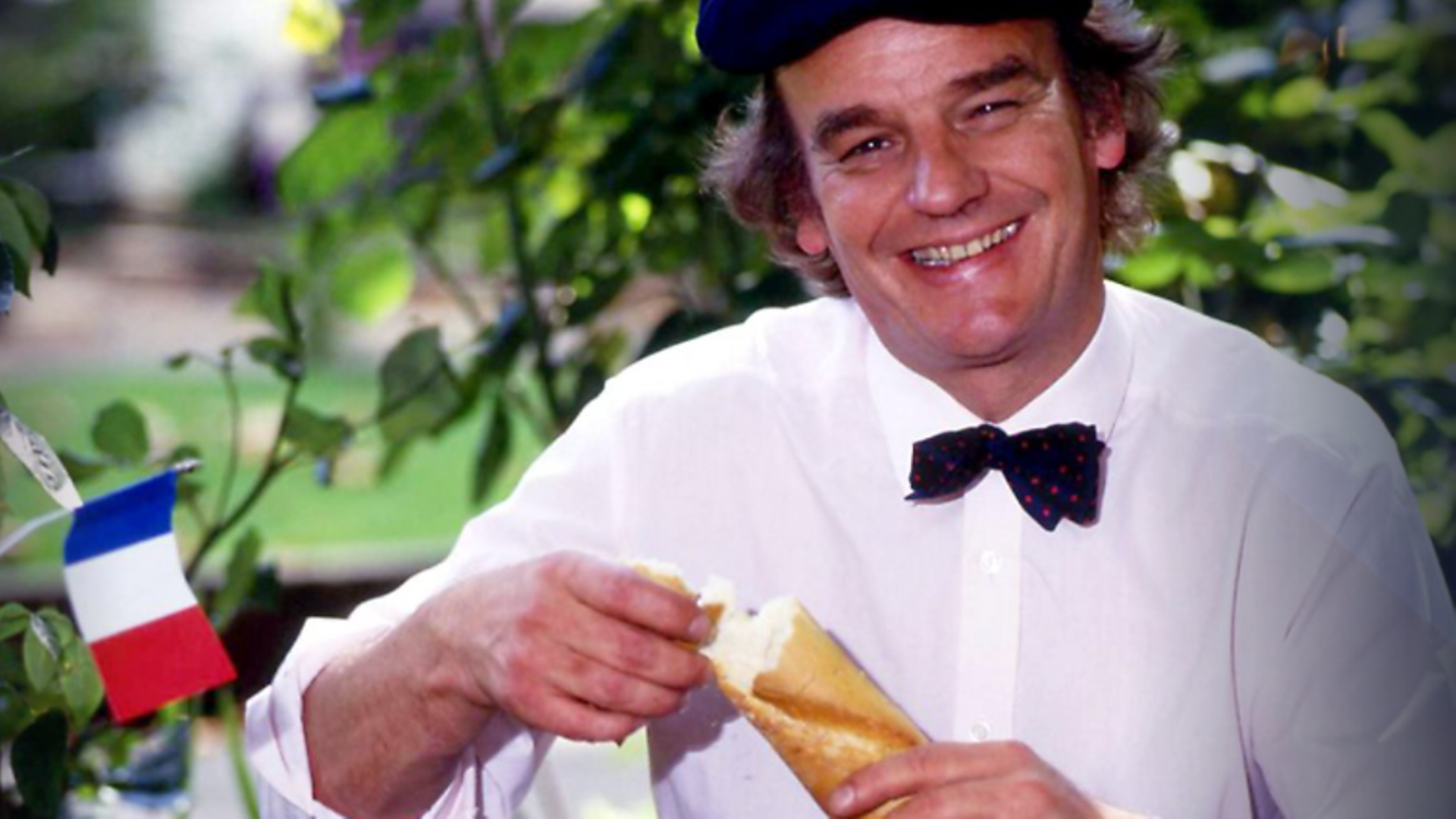He may never have achieved the international profile of a Karl Lagerfeld
or Giorgio Armani but among German-speaking nations, few designers could match the effervescent presence of Rudolph Moshammer.
As his contemporaries flitted between the catwalks of New York, Paris and Milan, Moshammer confined himself largely to his beloved Munich, running the boutique he opened in 1968 on the city’s exclusive Maximilianstrasse and designing clothes for a range of international clients including Arnold Schwarzenegger, Richard Chamberlain, King Carl Gustaf of Sweden, José Carreras and Siegfried & Roy.
Moshammer the designer was notable enough, but it was as ‘Mosi’, the flamboyant, high-camp staple of chat shows, gossip magazines and adverts, hawking everything from car rentals to hamburgers, that he really stood out.
His unique sense of personal style made him instantly recognisable across Germany. The waxed moustache, the constant companionship of a Yorkshire terrier called Daisy, and the elaborate – some might say preposterous – giant wig he wore: jet black with two curls dipping on to his forehead in imitation of his cultural inspiration, Ludwig II of Bavaria, who, among other things, created the fairytale castle at Neuschwanstein before being removed from the throne for his extravagant spending. Indeed, Moshammer himself was often described as the closest thing Munich had to royalty: a description he was happy to embrace.
No Munich opera, theatre or film premiere was complete without Mosi’s presence on the red carpet and he was a regular at the Salzburg and Bayreuth festivals and Vienna Opera Ball.
When the Rolling Stones played at Munich’s Olympiastadion in 2003, so great was the roar from the crowd when he arrived and took his seat it all but drowned out the bemused support act, The Cranberries.
He may have been dubbed Germany’s only genuine eccentric, but Moshammer was far cannier than he looked. A pioneer of personality branding, his instantly recognisable flamboyance guaranteed spectacular publicity for his wares.
He claimed to sell a million Moshammer-brand neckties a year, and while the real figure may have been some way short of that he was still spectacularly rich, living in Grünwald – reportedly Germany’s wealthiest suburb, on the outskirts of Munich – and commuting to his boutique in one of his three Rolls-Royces.
The centre of his operation was the Carnaval de Venise, the Munich shop he opened at the age of 28 and owned for the rest of his life. Moshammer arrived at the store’s 1968 opening in a horse-drawn carriage accompanied by a leopard on a lead. A red carpet stretched almost the length of the street to the door of the shop: Germany had rarely seen such extravagant opulence, certainly not since the war.
Whether he was welcoming German high society to his store or grinning among popping flashbulbs on a red carpet, it would have been easy to assume that Moshammer had arrived in the world fully formed, as exaggeratedly baroque as his hero Ludwig II and as noisily bombastic as the work of his other great cultural love, Richard Wagner.
But the life and image he had created for himself couldn’t have been further from the reality of his background. His father, Richard, had been a successful insurance company director during Germany’s postwar economic miracle. The family fortunes fluctuated during the mid-1950s however and Rudolph’s privileged childhood was plunged into traumatic adolescence.
Richard lost his job, something he tried to hide from the family, then developed a chronic addiction to alcohol that facilitated a terminal downward spiral. When his drunken rages turned violent, his wife Else left with her son, and Richard spent his last years on the streets as a homeless alcoholic.
Practically penniless, Else struggled to pay the rent and bills and frequently the electricity was cut off. The pair shivered through freezing Bavarian winters, barely surviving on a meagre diet of potatoes. They lived under the constant threat of eviction.
Apprenticed to a tailor, Rudolph soon quit when he found he could earn more from the hats and overcoats he was designing for, and selling to, his mother’s friends. An apprenticeship in retail sales at a Munich fabric outlet taught Moshammer the tricks of the trade that led him to that sumptuous gala opening of Carnaval de Venise.
For all his wealth and profile, Moshammer never forgot the personal circumstances that had engulfed his formative years. He founded the charity Licht für Obdachlose, Light for the Homeless, hosting a lavish Christmas lunch every year for Munich’s indigent population and raising money via high-profile gestures such as auctioning a shirt worn by Napoleon Bonaparte, found in his carriage after the Battle of Waterloo, for about £52,000 in 2002.
He helped to fund a treatment centre for alcoholics and could often be seen selling copies of BISS, a German equivalent of The Big Issue, in Munich’s main square, also taking out advertising space on Maximilianstrasse, encouraging wealthy shoppers to Kauf BISS! – buy BISS!
At the time of his death, Moshammer was about to open a refuge shelter for the homeless with beds for 60 people.
So full and vivacious was his life that his death in January 2005 came as a genuine shock to the nation.
On the morning of January 15, his chauffeur arrived, as usual, to drive Moshammer into Munich but found the front door open and the house quiet except for Daisy’s barking. The chauffeur discovered the designer lying dead outside his bedroom on the first floor, clearly having been strangled with a telephone cable.
It transpired that, the previous night, Moshammer had picked up a male prostitute near the central railway station in Munich and taken him back to Grünwald (Moshammer never came out publicly, possibly a legacy of how homosexuality in Germany was not fully legalised until 1994). A dispute broke out over the price of the transaction and the man throttled the 64-year-old designer with the cord of his bedside phone.
There was a huge outpouring of public grief. The gates of his home and the
frontage of Carnaval de Venise were inundated with flowers and candles and the funeral a few days later brought Munich to a standstill. Ten thousand
people lined the streets and the event was carried live on national television,
drawing comparisons to state funerals granted to royalty. Certainly, it felt as
though Munich had lost its prince.
Moshammer had been a joyous presence in his city and beyond. Beneath the extravagant image and embracing of the limelight was a man who simply wanted to bring beauty and happiness to the world, because he’d lived through the alternative.
“Beauty is not as important during the good times,” he said a month before his death. “In good times we have sold t-shirts with holes in them and people have said, ‘very nice, but not enough holes’. In bad times, like now, beauty is in great demand. In bad times, people are desperate for romance.”




